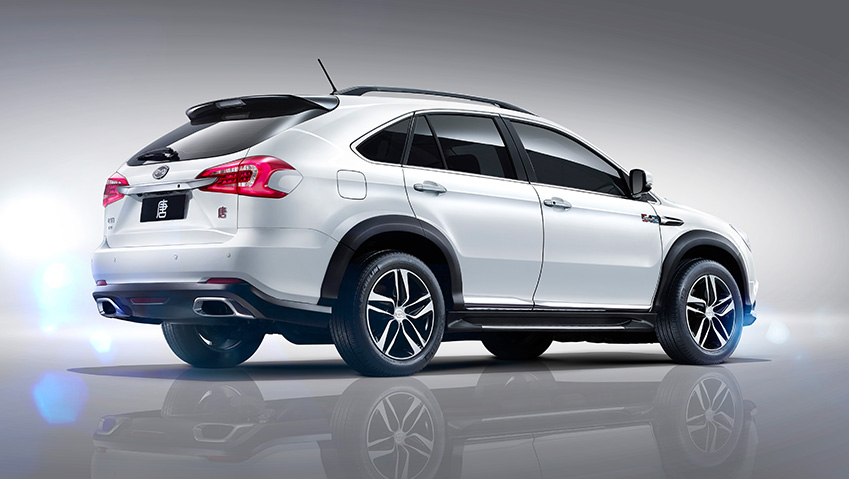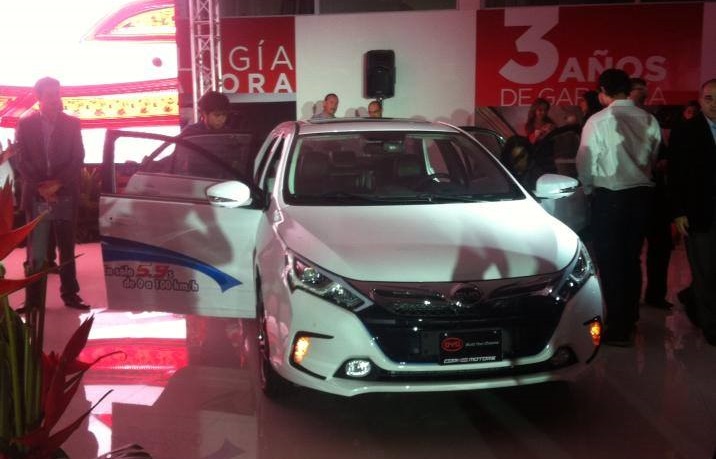Five years after the Nissan Leaf and Chevy Volt first went on sale, plug-in vehicles represent slightly less than 1 percent of U.S. new-car deliveries.
With about 200,000 sold, the Leaf is the world's most popular electric car.
But which carmaker sold the most cars with plugs last year, worldwide? The answer may surprise you.
DON'T MISS: China Built 25,000 Electric Cars & Plug-In Hybrids In June 2015 Alone
First, the known suspects: BMW, Ford, GM, Nissan, and Tesla.
BMW said it sold "around 30,000" of its i3 and i8 in 2015, globally. Ford's plug-in hybrid Fusion and C-Max Energi models, and its Focus Electric battery hatchback, are largely confined to North America.
U.S. sales of those cars totaled 18,923; the company refuses to disclose how many were sold in Canada. Adding a handful sold in Europe, let's say 20,000 all told for Ford.

BMW i3 and i8 preview, New York City, November 2011, photo by Tom Moloughney
General Motors sold 15,393 Volts and 2,629 Spark EVs in the U.S. last year, along with some in Canada and a few Spark EVs in South Korea. Let's call that 20,000 too.
The Nissan Leaf had 17,269 deliveries in the U.S., but it's sold in dozens of countries around the world--and Nissan also sells lower numbers of e-NV200 electric delivery vans.
As of October 2015, Nissan had delivered 39,000 Leafs--but global full-year figures for the Leaf and e-NV200 aren't out yet. Let's put Nissan at 50,000.
ALSO SEE: 2016 BYD Tang: Plug-In Hybrid SUV Is First Of Four To Come
Finally, Tesla says it delivered 50,557 vehicles globally last year. So who's missing?
It's BYD, the Chinese company that launched the world's first production plug-in hybrid, the F3DM, in December 2008--exactly two years before the Chevrolet Volt.
The crude F3DM was far less refined than the Volt, but it nonetheless earned an historic first for BYD (in which fabled investor Warren Buffet has invested).

2016 BYD Tang plug-in hybrid SUV, made in China
BYD continues to make both battery-electric vehicles (including the E6 hatchbacks used as taxis) and a variety of plug-in hybrids, including the newer Qin compact sedan and Tang compact SUV.
According to year-end figures released by the company, it delivered 31,898 Qins and 18,375 Tangs, along with 7,029 of the older e6, during 2015.
Added to that are small numbers of the T3 small commercial van and e5 battery-electric compact sedan, along with 2,888 Denza compact hatchbacks built by its joint venture with Daimler.
CHECK OUT: China To Top U.S. Electric-Car Sales? Why Stats Don't Compare
Altogether, BYD sold a total of 61,722 vehicles with plugs last year--all but a tiny handful in China--more than Nissan or Tesla.
For the record, those are all highway-capable cars; the numbers don't include what would be defined in North America as low-speed or neighborhood electric vehicles.
Those vehicles make up a significant portion of the Chinese electric-car sales statistics, but they make direct comparisons of the Chinese and U.S. markets tricky, since low-speed vehicles don't count toward reported U.S. sales.

BYD Qin plug-in hybrid in showroom in Costa Rica
Aside from a tiny number of exports to minor markets like Costa Rica, the BYD passenger-vehicle sales are almost entirely in China.
The country working hard to boost sales of "New Energy Vehicles," both battery-electric and plug-in hybrid vehicles of all sorts, to address the toxic air pollution that blankets most of its cities.
MORE: BYD Qin Plug-In Hybrid Now On Sale In Costa Rica (Dec 2013)
Carrots at the city, state, and national level include financial incentives and easily available registration for new plug-in cars.
Sticks include very low numbers of permitted new registrations of conventional cars in some cities, and odd/even alternating driving permissions.

BYD K9 All-Electric Bus, as tested in Portland OR
China is expected to become the world's largest market for electric cars, and its government-industrial complex has dominating that sector as an official goal.
Given the paucity of public charging networks and the large number of car owners who live in apartment buildings, however, it remains unclear how many of the country's plug-in hybrids are ever actually plugged in.
BYD also produces electric buses--one with a battery pack of 549 kilowatt-hours--with which it has had some success entering the U.S. public-transport market.
_______________________________________












